
CIES is the largest and oldest of 47 comparative and educational societies around the world. The CIES annual meeting brings together experts in the field of education from around the world to share their latest research and transformative ideas on how to improve education for a more equitable world.
Its more than 4,000 individual members include researchers, analysts, practitioners and students, and represents over 1,000 universities, research institutes, government departments, non-governmental organizations, and multilateral agencies.
Where to find VSO at CIES 2023
Regenerating Hope in Nepal
At the conference, we'll be presenting findings from our Empowering a new generation of adolescent girls with education (ENGAGE) project in Nepal which has been supporting marginalised and out-of-school girls to benefit from a quality education and develop the skills they need to earn a decent living. The project also focuses on helping girls with disabilities to access an equal education. Watch the video below to hear how ENGAGE is regenerating hope for marginalised girls.
Case studies from ENGAGE
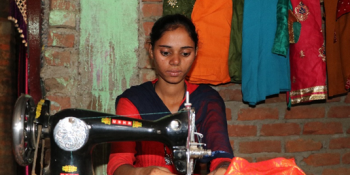
From school dropout to business woman - Anju's journey
Anju is 20-year-old woman from Malangawa in Nepal who belongs to a Dalit community. She dropped out of school at the age of 8 due to her families poverty. Today Anju runs a successful tailoring business. This is her story.
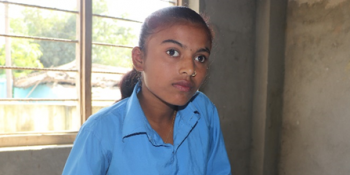
Breaking down stereotypes of people with disabilities
15 years old Nisha is a resident of Sakraul, Nepal living with a disability. People in her community used to call her names which hurt her feelings and broke her confidence down. Now she's returned to school and the communities sees that she can do anything. Read her story.
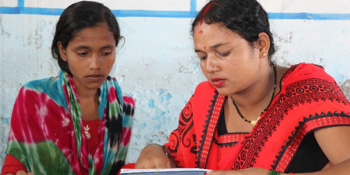
Using education to unlock a better future and happy life
Dhanmati's work as a volunteer on VSO's ENGAGE project has changed attitudes to girls education in her community and helped girls to return to education. She firmly believes that education is the key to unlocking a better future and living a happy life.
Where to find VSO at CIES 2023:
VSO will be taking part in a number of panels at the conference and presenting findings from our research and evaluations.
Blended continuous professional development for educators: Case studies from the Global South
Who: Purna Shrestha - Global Technical Lead for VSO's Resilient and Inclusive Education programmes
When: Sunday 19 February, 2:45 - 4:15pm EST (7:45 - 9:15pm GMT)
Where: Grand Hyatt Washington, Floor: Declaration Level (1B), Penn Quarter A.
Across the world, COVID-19 induced school closures severely disrupted learning, disproportionally affecting those from more disadvantaged backgrounds. Amid intermittent school closures, many governments have shifted towards remote and online education. At the same time, Continuous Professional Development (CPD) of educators shifted to remote and online delivery. Yet often, these educators were not well prepared for this. Educators found themselves lacking either the necessary digital infrastructure or the required skills to effectively participate in remote and online CPD.
A number of lessons have been distilled on how to best support educators and school systems to utilize these blended approaches, which will be presented and discussed in this panel, with a focus on diversity, gender and inclusion, engagement and motivation, and cost-effectiveness, scalability and sustainability.
During the panel, three case studies will be presented to illustrate how these principles cut across the analysis, design, development, implementation and evaluation of blended CPD trajectories for educators. VSO will share how principles of Universal Design for Learning were applied in a blended CPD offering to Early Childhood Education and Care Educators in Bangladesh.
How to design appropriate learning assessments to ensure greater inclusion of children with disabilities
Who: Purna Shrestha - Global Technical Lead for VSO's Resilient and Inclusive Education programmes.
When: Monday 20 February, 2:45 - 4:15pm EST (7:45 - 9:15pm GMT)
Where: Grand Hyatt Washington, Floor: Declaration Level (1B), Penn Quarter B.
Article 24 of the UN Convention on the Rights of Persons with Disabilities (CRPD) states that countries must ensure that “persons with disabilities are not excluded from the general education system on the basis of disability,”...with the goal of full inclusion. Further, SDG 4 aims to “ensure inclusive and equitable quality education and promote lifelong learning opportunities for all”.
To this end, many countries have invested considerable efforts to increase access to and the quality of education for children with disabilities. Nevertheless, a myriad of challenges remain to reach these goals. For countries that are succeeding in getting children with disabilities into the classroom and addressing their needs through inclusive pedagogies, there is a fundamental need to ensure that assessments – at classroom, school, national, and international level – are inclusive and accessible to these children.
Many funders and implementers have confronted the question of how to create learning assessments that can be inclusive of learners with disabilities. However, their experiences and learnings had not been captured to-date through a review specifically on designing inclusive learning assessments.
As such, the Girls’ Education Challenge Fund Manager, (funded by the UK Aid, and All Children Reading: A Grand Challenge for Development (ACR GCD) in partnership USAID, World Vision and the Australian Government) collaboratively developed a technical brief that captures the importance of, progress towards, and lessons learned from the development of inclusive learning assessments for children. The goal of this technical brief is to help others make their learning assessments more inclusive of children with disabilities and to measure their learning outcomes more validly and reliably.
Panelists will highlight experiences documented in the technical brief and will present specific case studies on how projects have adapted learning assessments to be inclusive of children with disabilities.
Reducing education injustice and social exclusion through curriculum and practice
Who: Clodagh Byrne - Lead Advisor for Resilience at VSO and Purna Shrestha - Global Technical Lead for VSO's Resilient and Inclusive Education programmes
When: Wednesday 15 February, 9:30 - 11:00am EST (2:30 - 4:00pm GMT)
Where: Online Meeting Hub, Zoom Room 119
As climate change intensifies, so too does the urgency of building the resilience of children, their communities, and sustainability within systems upon which they depend. Children living in environmentally fragile contexts experience disproportionate impacts due to their direct exposure to climate related hazards such as floods, droughts, heatwaves as well as reduced access to food, water and socio-economic assets during times of climate stress.
These impacts are aggravated by the disruption of their access to education systems, as well as the increased health and environmental risks faced within education facilities during times of climatic shock. While climate induced disasters and stresses erode the assets and systems that children and their families depend on for their wellbeing, education facilities and systems have potential to contribute towards a more environmentally sustainable society through building critical assets and capabilities for climate adaptation and mitigation.
The paper presented in this panel draws on findings from a multi-country education resilience intervention which aims to build education system resilience through engaging children, youth, teachers and education leaders in climate adaptation, mitigation and environmental sustainability planning. Through participating in climate resilience assessments and action planning, impacts of climate change on education facilities in over 50 marginalised locations in Nepal, Bangladesh, Tanzania, Kenya and Rwanda have been assessed, and critical assets and capabilities have been prioritised by youth, children, teachers, parents and carers as essential for resilience and environmental sustainability. These have been translated into actions within school improvement planning, and local level climate adaptation and development planning.
Examples of our education projects
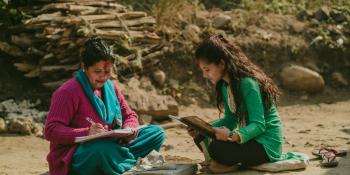
Empowering a new generation of adolescent girls with education (ENGAGE)
Addressing socio-cultural norms in Nepal to ensure girls education is prioritised, and girls with disabilities are given the chance to thrive.
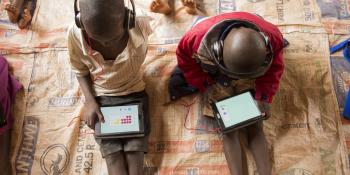
Building Educational Foundations through Innovation and Technology (BEFIT)
Improving foundational literacy and numeracy skills for 3.5 million children in Malawi.
Building Learning Foundations
Developing long-term, sustainable solutions to improve basic teaching for every child in Rwanda.
